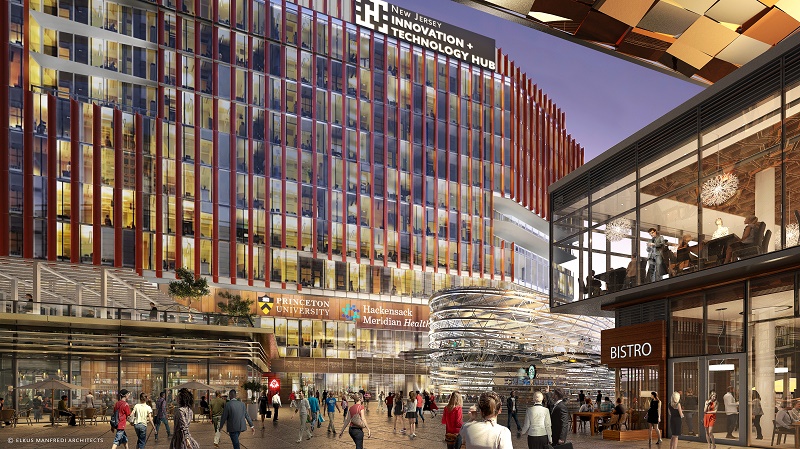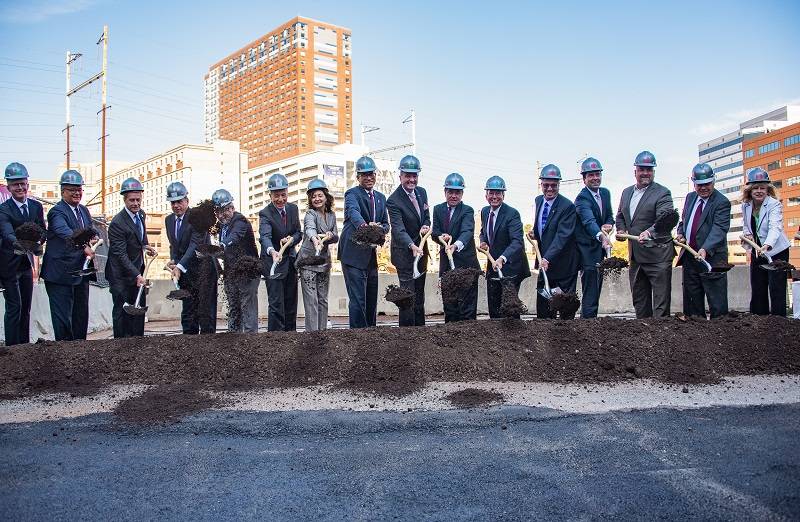Gov. Phil Murphy joined health care and academic leaders and other public officials on Oct. 14 to break ground on the New Jersey Innovation and Technology Hub, a 555,000-square-foot research complex in New Brunswick. Courtesy: Governor’s Office/OIT
By Joshua Burd
Construction is set to begin on a two-building, 555,000-square-foot research complex in New Brunswick, the future home of the state’s flagship medical school and a place where startups can work side by side with New Jersey’s top health care and academic institutions.
Known as the New Jersey Innovation and Technology Hub, the $665 million project will be home to both the Rutgers Robert Wood Johnson Medical School and the Rutgers Translational Research facility, which will allow for collaboration among scientists from varied backgrounds. Both uses will complement an innovation center that will feature collaborative workspaces, wet and dry laboratories, conference facilities and other amenities that will allow researchers to convene with budding technology and life sciences firms.
Those researchers figure to come from The Hub’s high-profile partners — including Rutgers University, RWJBarnabas Health and Hackensack Meridian Health — and its first tenant, Princeton University. New Brunswick Development Corp., or Devco, is spearheading the overall project, in a plan that will transform a four-acre parcel in the downtown.
“It will be a place where doctors and researchers will work shoulder to shoulder on innovative treatments and solutions, from bench to bedside,” Gov. Phil Murphy said Thursday during a groundbreaking ceremony. “Think about it this way: The Hub will be that rare standalone center where clinicians and researchers from across the pharma and life science sectors can have immediate and daily access to academic and industry experts as they fine-tune their advances — and, by the way, to the investors they will need to then take those advances to market, where they can then treat patients around the world.
“This is how we purpose-build a diverse economy and an innovative ecosystem for long-term success.”

Murphy was among the many public officials and stakeholders on hand at the property, which sits just south of Albany Street between Kirkpatrick and Spring streets. He added that, when complete, The Hub “will leverage and put on clear display and under one roof everything New Jersey offers — our world-leading institutions of higher education and our world-class health networks, our access to global markets and venture capital and our diverse, highly educated and highly skilled workforce.”
According to Christopher Paladino, Devco’s president, the larger building will encompass roughly 420,000 square feet and include both the innovation center and the Rutgers Translational Research facility. The new medical school will occupy the second building next door, providing important direct access to Robert Wood Johnson University Hospital.
“Medical education has changed dramatically,” Paladino said, noting that the two-year medical school dates back to the 1960s. “Probably the most important thing is that medical students today start going into the hospital and seeing patients from day one. It’s not in that third and fourth year anymore, so we wanted to bring them down next to the hospital.”
Devco has spent several years laying the groundwork for the project, which sits directly across from the city’s train station, prompting Murphy to identify the site in 2018 as a focal point for growing health care, higher education and technology in the state. Last fall, the governor announced the commitments from Rutgers, Hackensack Meridian and RWJBarnabas as The Hub’s first three partners, with Princeton as its first tenant, paving the way for a groundbreaking at the site.
The state on Thursday announced the addition of the medical school and the translational research facility, along with the Economic Development Authority, Devco and Middlesex County as core partners. Choose New Jersey, the state’s not-for-profit business attraction agency, will also be a tenant.
“It’s always a question that we get asked: What does all this mean to the person on the street?” said Barry Ostrowsky, CEO and president of RWJBarnabas Health. “What it means is the smartest minds, the people motivated to do best, are getting together to produce a service and a product that will help all of us live better lives.
“So for us, we can’t wait for this hub to open, for the collaboration I know that will take place among our partners, for the product of that which we are going to invest in. And, frankly, for everyone in this community, the greater region and the United States, this hub will serve as clear indication that the state of New Jersey and its participants … is a leader in taking care of those who live in our communities.”
In addition to work and research areas, the innovation center will include support and amenity spaces such as a fully equipped makers’ space, a ground-floor market hall and café and an auditorium and multipurpose space, according to a news release. Startups and entrepreneurs will be able to access the spaces, amenities and services through membership packages.
The core partners, which will share in the governance and management of the property, and the initial tenants will have office space that will promote direct connections with members of the innovation center. Meantime, Middlesex County will host several economic development initiatives at The Hub, including efforts to enable and support businesses that develop products, technologies, services and insights.
Paladino said the second phase of the project could include another 500,000 square feet, which could attract major biotech or pharmaceutical companies or an operator that builds speculative lab space for multiple users. In the meantime, the development is transforming the onetime home of a hulking, concrete parking deck and retail mall that was once a key piece of the city’s economic development strategy.
“That mall was built at a time when the city of New Brunswick was really fortunate enough, thinking that if we could get somebody on their way to the train station and get them to buy a cup of coffee or drop off their dry cleaning or get an ice cream cone, we were doing a good job,” New Brunswick Mayor Jim Cahill said. “But New Brunswick has transformed and it is now a destination — thus, this project.
“We recognize the potential of The Hub site, with its central location right here in the heart of New Jersey, directly across from the city’s train station on the most traveled rail line in the United States, and the opportunity for unique space for technology and innovation ventures, corporate offices, academic and corporate research facilities, together with potential exciting retail and residential options. We marketed the site and went so far as demolishing the structure at no small cost to make it easier for prospective occupants to envision the potential of the site. Governor, that’s where you came in.”
Devco and state officials noted that the Rutgers Translational Research facility and the new medical school building will mark the first new development of capital infrastructure in the history of Rutgers Biomedical and Health Sciences, which was created by the 2013 merger of the University of Medicine and Dentistry of New Jersey into Rutgers.
“The investment in The Hub seeds the innovation that will fuel the translational research facility and the medical school building, unleashing the collective power of one of America’s greatest public research universities with industry and other academic partners to disrupt and transform the state and regional economies,” Rutgers President Jonathan Holloway said. “The vision embraced in this project — including leveraging the innovative population hub with the translational research facility and the Robert Wood Johnson Medical School building — is a tribute to the power of shared commitment and innovation.”
‘The Hub’ in New Brunswick eyes groundbreaking with higher ed, health care partners in tow










